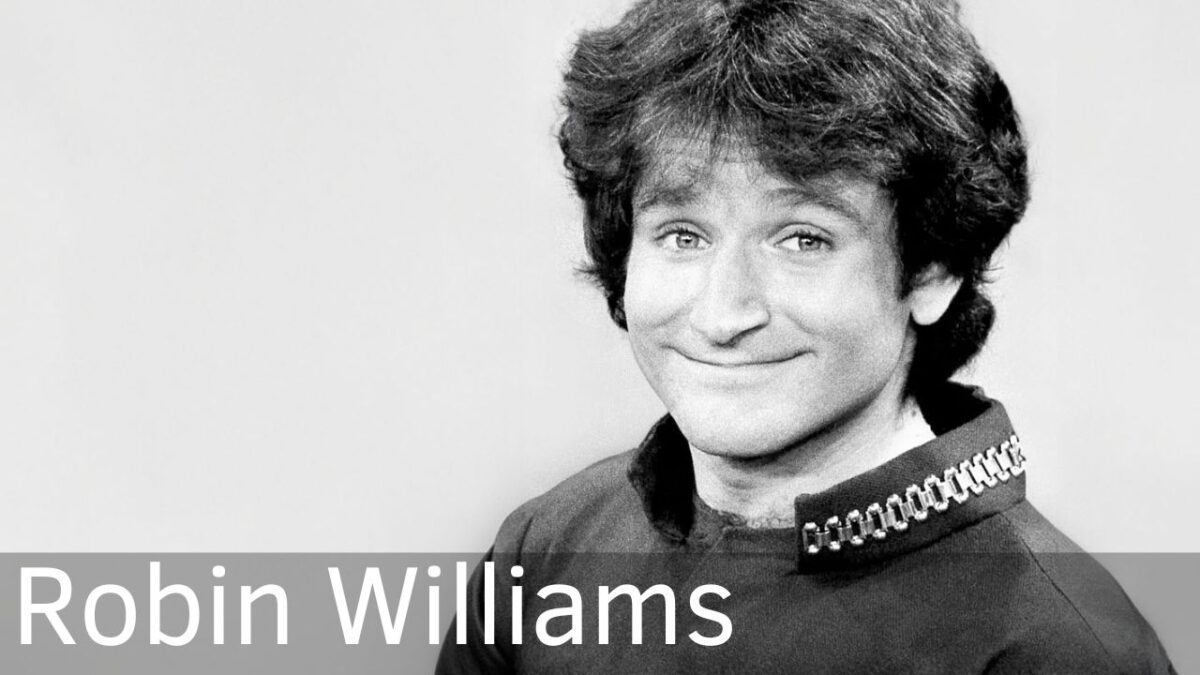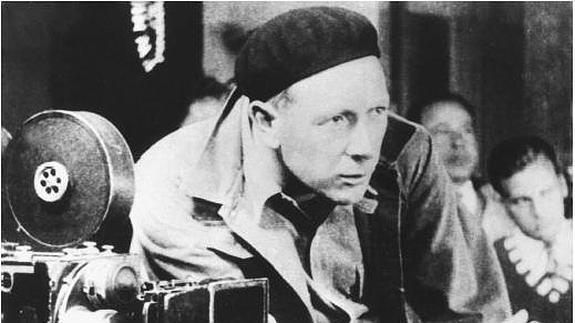Robin Williams Biography
It has been a decade since Robin Williams passed away, and I still remember the day he died. I was working in an open floor plan office and as I walked towards my desk, the person sitting across from me said, “Robin Williams died.” Without thinking, I responded with some insensitive joke. She managed to pull off two emotions with the same look. The first maintaining the sadness at his loss, while also adding disgust to my stupid joke. As I sat down at my desk, the realization of the loss began to set in as I thought about what an amazing person he was.
Early Life
Robin McLaurin Williams was born in Chicago, Illinois on July 21, 1951. His father was an executive at the Ford Motor Company, and his mother was a former model. The family eventually moved to Bloomfield Hills, Michigan, where they lived in a 40-room farmhouse. Robin was a good student at the private Detroit Country Day School and was heavily involved in extracurricular activities, such as wrestling and serving as class president. He used his natural sense of humor to charm his peers, a trait that he carried with him into adulthood and maintained throughout his life.
After his father’s retirement, the family moved once more to California. Robin enrolled at Claremont College intending to study political science, a path encouraged by his father. While there, he was introduced to theatre. This led him to change his major and transfer to the College of Marin, a community college in Kentfield, California. Later, he received a scholarship to the prestigious acting school Julliard.
He was one of 20 students accepted into the freshman class. Fellow classmates included Christopher Reeve, William Hurt, and Mandy Patinkin. Reeve and Williams remained close friends until Reeve passed away in 2004. Williams’ genius shined at Julliard even when working with other great performers. His manic energy and innate ability to transform into different characters made him stand out, and he excelled equally in both comedic and dramatic roles. He left Julliard during his junior year to pursue stand-up comedy, after one of his teachers told him there was nothing more Julliard could teach him.
Standup
During his time in school, Robin Williams experimented with stand-up comedy at small bars and clubs in New York. After leaving Julliard, he moved to the San Francisco Bay Area to pursue his stand-up career. It didn’t take long for Williams to achieve success on the stand-up circuit, as he quickly made his way from San Francisco to Los Angeles, performing at various clubs such as The Comedy Store.
In 1979, he won his first Grammy for his comedy album “Reality … What a Concept”
Williams would continue to do stand-up comedy throughout his life.
The Screen
It should be no surprise that his talents were recognized by TV and movie producers. His first on screen appearance happened on the revival of “Laugh-In” in 1977. The show didn’t laugh (last) last long. He also had a minor role in the low-budget comedy “Can I Do It ‘Till I Need Glasses?” (1977).
When Mork & Mindy (1978 – 1982) premiered, the name Robin Williams became a household staple. In this series, Williams played a quirky extraterrestrial studying human behavior on Earth. This character was originally introduced in two episodes of Happy Days (1974 – 1984), which later inspired the spinoff show. His improvisational method of performing forced the director of Mork & Mindy to add a fourth camera to catch all the action. This is a standard used to this day in sitcoms.
The sitcom was such a massive hit that it spawned a line of merchandise, including lunch boxes, posters, and toys. People even dressed up as Mork for Halloween. William’s portrayal of the lovable alien earned him a spot on the covers of Time and Rolling Stone magazine. He would win two Golden Globes for his performance in Mork & Mindy.
Williams’ first major foray from the small to the big screen was with his lead role in Popeye, acting alongside Shelley Duvall. The movie was critically panned, however has developed a bit of a cult following since. Following his success on Mork & Mindy, he went on to star in the critically acclaimed film The World According to Garp (1982). This movie also marked the big screen debut of Glenn Close.
After The World According to Garp, his star would continue to rise with an overlooked performance in “Club Paradise.” He would receive his first Academy Award nomination for “Good Morning, Vietnam” (1987) and “Dead Poets Society” (1989) which also garnered him an Academy Award nomination. In total, he received 4 academy award nominations but only won once for his role as best supporting actor in “Good Will Hunting” (1997).
From playing the saxophone for “Moscow on the Hudson” (1984), to voicing the beloved Genie in Aladdin (1992), and seamlessly transitioning between characters in Mrs. Doubtfire (1993), Robin Williams could do it all. He even took on roles as a former president in “Night at the Museum” (2006) and a gentle, gay man in “The Birdcage” (1996). And that’s just a few highlights from his impressive resume.
Philanthropy
Robin Williams was actively involved in numerous charitable organizations. He would tour multiple times with the USO entertaining soldiers.
Along with Whoopi Goldberg and Billy Crystal, he co-founded Comic Relief USA to raise money for the homeless. Furthermore, he advocated for women’s rights and, alongside his second wife Marsha, established a philanthropic foundation called the Windfall Foundation.
Personal Life
He married his first wife Valerie, in 1978, with whom had his first child. Unfortunately, his infidelity led to numerous extramarital affairs and eventually led to the demise of their marriage. They would divorce in 1988.
As Williams worked long hours into the night, trying to sustain his energy and keeping company with people who had easy access to drugs, he developed a dangerous dependence on both drugs and alcohol. He would spend entire nights out drinking and snorting cocaine, only to show up strung out for shooting Mork & Mindy the next day. And the cycle would continue each night.
After the tragic death of fellow comedian and friend, John Belushi, due to a drug overdose in 1982, Williams realized he needed to make a change. Williams had partied earlier that very night with Belushi. Williams turned to biking as a way to combat his own addictive tendencies.
After separating from Valerie, Williams began a romantic relationship with his child’s nanny, Marsha. Although they were accused of having an affair during his first marriage, both denied any involvement until after his separation. On April 30, 1989, they got married. Marsha was six months pregnant with their first child at the time. They had two more children together. She would also work with Robin as an assistant of his films, and together they formed a production company called Blue Wolf Productions. However, their marriage ended in divorce in 2008.
Although Williams stopped using drugs, his undiagnosed depression or manic depression still persisted. He would experience extreme emotional highs and lows, as anyone who saw an interview with him could attest to his energetic and almost manic behavior on screen. However, when the cameras were off, Williams was more somber in his interactions with others. This underlying depression may have influenced his decision to take on darker roles in his later films instead of his usual comedic roles.
in spite of his efforts to overcome addiction, he fell back into it years later. In 2003, while working on a film in Alaska he started drinking again. Despite going through rehab multiple times, he continued to relapse and return to alcohol. He found humor in his struggles and talked about them during his comedic performances.
In 2007, he met Susan Schneider who would later become his third wife in October of 2011. They would stay married until his death.
While on his “Weapons of Self-Destruction” tour, he suffered from cardiac problems that required him to postpone some show dates. In March 2009, he underwent surgery to replace his aortic valve, repair his mitral valve, and correct his irregular heartbeat. Following the surgery, he had to scale back on his workload, doing fewer movies and stand-up performances.
Continuing to suffer from severe depression, he started to experience a decline in his mental abilities. This manifested as forgetfulness, anxiety, and insomnia. Over time, these symptoms worsened, and he also began to struggle with memory loss, paranoia, and delusions.
After seeking treatment, he was mistakenly diagnosed with Parkinson’s disease, but it was later discovered to be dementia with Lewy bodies. Both diseases manifest with similar symptoms. The correct diagnosis was not made until after his death. According to his wife, Susan, “Robin was losing his mind, and he was aware of it … He kept saying, ‘I just want to reboot my brain.’”
Death
On August 11th, 2014, Robin took his own life to end his suffering. The news shocked the world as he did such a good job of hiding his issues, even those closest to him didn’t see it coming. Including my co-worker who was saddened by the loss, and myself who often uses humor to deal with uncomfortable situations.
Fortunately, when I think of Robin Williams, I can remember all the memorable roles he played and watch one of his movies or laugh along with one of his timeless stand-up comedy performances.
Robin Williams’ ashes were scattered in San Francisco Bay.
Related Posts
Leave a Reply Cancel reply
This site uses Akismet to reduce spam. Learn how your comment data is processed.





